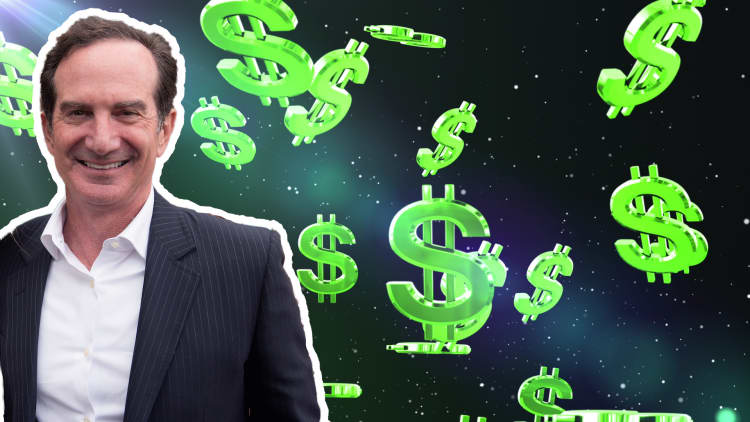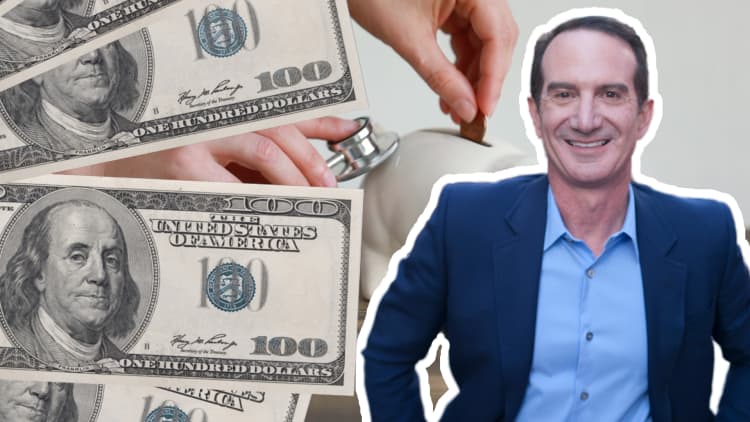If you don't yet have an emergency fund in place, you're not alone. In the U.S., nearly three in 10 (28%) adults do not have any money set aside in case of an emergency, according to Bankrate.
The good news is: If you fall within that 28%, it's never too late to start. With the new year around the corner, you can make 2020 the time you finally set up an emergency fund.
But first, you'll need to know how much you should put away. Here's how to figure out the total you'll need and how much you should aim to save each month.
How to calculate how much you need in an emergency fund
Financial experts typically recommend having three to six months' worth of living expenses set away in an emergency fund. But the exact amount depends on how much you earn annually after taxes.
Follow these three steps to calculate the amount you'd need to save in 2020 to set up a three-month emergency fund. Here, we're using the median U.S. household income, which was just over $63,000 in 2018, as an example.
1. Figure out your take-home pay after taxes
To solve for your post-tax salary, multiply your total income by your tax rate, then subtract that number from your total salary.
In this case, we multiplied $63,000 by 0.25 to represent a 25% tax rate, which is about how much the average U.S. taxpayer spends each year. That equaled $15,750.
Then, we subtracted $15,750, the amount the average person would pay in taxes, from $63,000. That comes to $47,250 in take-home pay for a median income household.
It's important to note that tax rate you end up paying is highly individual. That's because U.S. tax rates are calculated on a marginal basis, which means that different levels of an individual's income are taxed at varying rates. If a single person earns a taxable income of $63,000 in 2020, the first $9,875 of that will be taxed at 10%. Then, the income between $9,875 and $40,125 would be taxed at 12% and their remaining taxable income after $40,125 would be taxed at 22%.
"This figure will vary a lot depending on the state or city where you reside, how much you earn, plus other personal factors, such as your 401(k) savings, whether you have kids, any tax deductions and more," explains Douglas Boneparth, president and founder of Bone Fide Wealth. You can view the new tax brackets for 2020 here.
2. Divide your post-tax salary by 12 months
This will give you an idea of how much you bring home each month.
In this case, we divided $47,250 by 12 months, which means about $4,000 is the amount of money needed to fund one month of an emergency fund.
3. Multiply that number by three
For the median earner, $4,000 multiplied by three would make $12,000 the total amount of money needed for a three-month emergency fund.
If you want to solve for a six-month emergency fund, simply multiply your monthly expenditure by six.
Certain situations may require you to put away more or less than this plan suggests. If you regularly invest a lot each month, such as in a 401(k) account, or have expensive insurance premiums that impact your monthly take-home pay, you may need to adjust your per-paycheck emergency fund deposits. If you aren't sure, you can always seek advice from a financial advisor.
Set a plan to reach your target amount
Next, you'll need a blueprint for how you'll get to $12,000 — or whatever your target amount may be — by the end of 2020. "It's good to set up a plan when saving for anything," Boneparth says. "Having a plan in place helps with accountability and execution because writing something down tends to make it more real."
One strategy is to plan a per-paycheck contribution. If you earn the median household income and get paid bi-weekly, that would mean making 26 payments of $461.54. If you're paid weekly, it would be 52 payments of $230.77.
If you stick to your payments all the way through 2020, you'll have the $12,000 needed to cover three months' worth of living costs by the end of the year.

If possible, consider putting your money in a high-yield savings account to earn interest on your deposits. You can also set up automated deposits straight from your paycheck to hold yourself accountable with making each per-paycheck contribution, Boneparth suggests.
Additionally, if you receive a healthy work bonus or tax refund, you could consider contributing some or all of it into your high-yields savings account. "Be committed," Boneparth says. "You're either in or out. It's a mindset."
While it's not always easy, you may need to sacrifice in other spending areas in order to have access to extra income that can go toward your emergency fund. This may require taking a hard look at your money habits so you can identify where you may be overspending. This process of "mastering cash flow" will help you "understand where you can cut and what you are willing to cut," Boneparth says.
Why you should have an emergency fund
Saving up for an emergency fund is a New Year's goal you can feel good about. Should unexpected circumstances arise, such as a hefty medical bill or losing your job, your cash reserve can act as your safety net.
"You don't want to have to use debt or long-term assets, like retirement accounts, to get yourself out of a difficult position," Boneparth says.
You don't want to have to use debt or long-term assets, like retirement accounts, to get yourself out of a difficult position.Douglas BoneparthPresident and Founder of Bone Fide Wealth
The reasons for needing an emergency fund will vary person-to-person. "It could range from being out of work due to disability to car repairs and home maintenance," Boneparth says. "Things break and life happens."
But no matter your circumstances, experts say having access to liquid cash is a smart idea: "To be able to keep moving forward despite an emergency is a massive win for your financial life. Cash reserves can be paramount to obtaining strong financial health."
Like this story? Subscribe to CNBC Make It on YouTube!
Don't miss:



